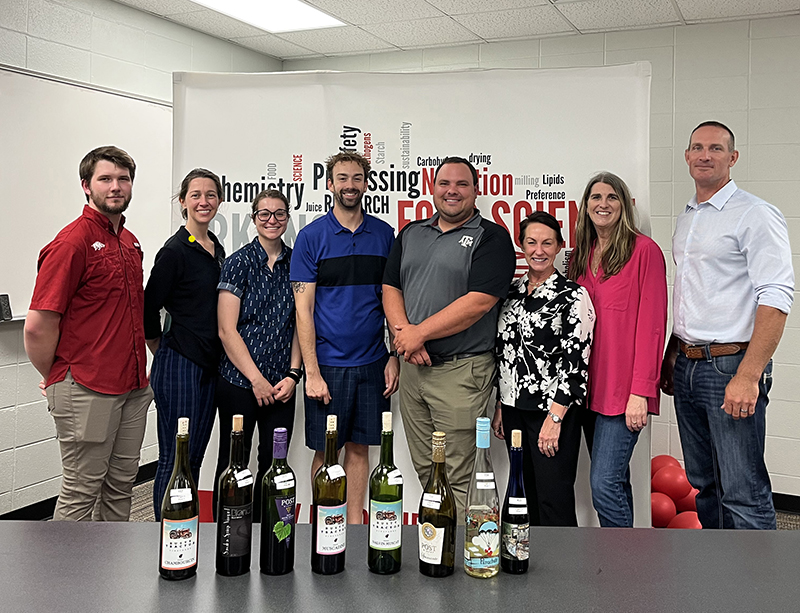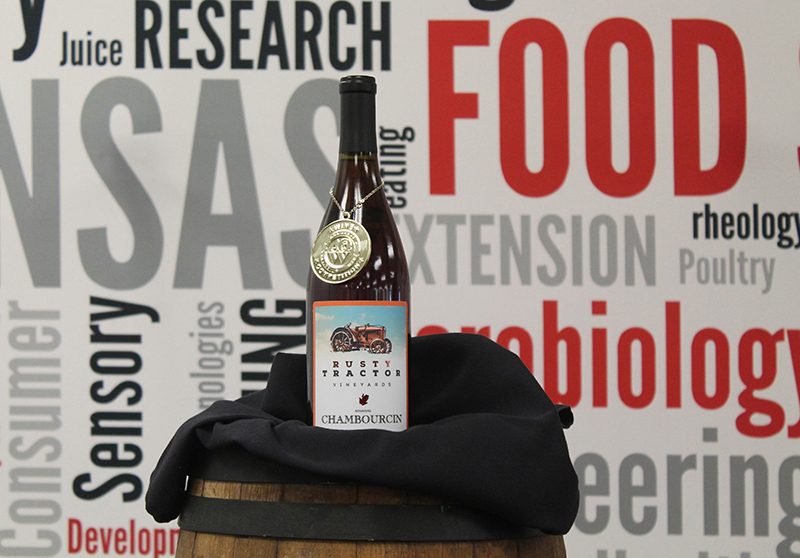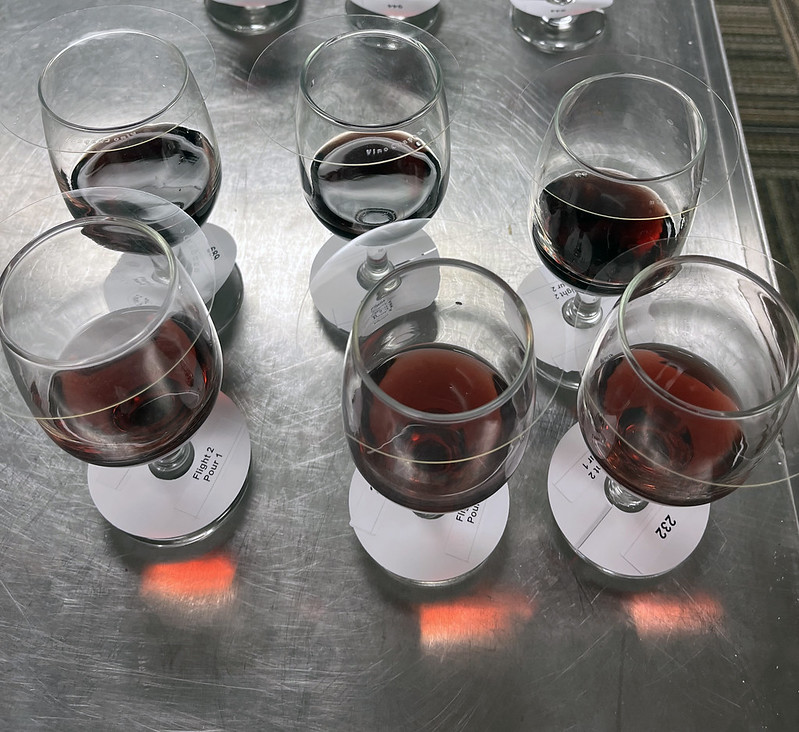Rusty Tractor Vineyards Chambourcin takes best of show in Arkansas Quality Wine competition
The competition is part of AQW’s efforts to set quality standards for Arkansas-made wine, provide professional development for growers and winemakers and entice consumers to taste the fruit of the state’s vines and their unique flavors.
By Mary Hightower
June 30, 2022
Fast facts
- Second Arkansas Quality Wine competition draws 30 entries
- Competition opens new category based on percentage of Arkansas grapes
- Tasting is first step to AQW certification
(935 words)
(Newsrooms — With 06-29-2022-ark-AQW-winners-list; ‘Lorri’ in 2nd graf is CQ; with art https://flic.kr/s/aHBqjzW9gr )
FAYETTEVILLE, Ark. — A Little Rock vineyard’s Chambourcin took best of show in the 2022 Arkansas Quality Wine competition — an event that impressed judges with its stereotype-breaking breadth of flavors and styles.

The competition, the second of its kind, was held May 20 at the food science facilities of the Milo J. Shult Agricultural Research and Extension Center and featured 30 entries. There were three judges: Justin Scheiner, Ph.D., assistant professor and viticulture specialist from Texas A&M AgriLife Extension Service; Michael Cook, viticulture program specialist for north Texas with the Texas A&M AgriLife Extension Service; and Lorri Hambuchen, author and owner of The Wine Center in Little Rock.
Begun in 2011 with the planting of 200 muscadine vines, Rusty Tractor Vineyards has since expanded to more than 5,000 vines with a wide variety of grapes. Just two years after releasing its first vintage, Rusty Tractor’s 2020 Chambourcin took home best of show.

“I’m absolutely humbled to win best of show,” said Riley Mason, Rusty Tractor’s winemaker. “When you put your hard work out there for the public to critique and you get good feedback it’s extremely gratifying. I’m very pleased that the wines I am making are so well received.
Judges in the 2022 Arkansas Quality Wine program said they were impressed with the variety of wines with broad appeal being made in the Natural State.
“It was my second year judging the AQW Wine Competition and I continue to be impressed with the quality of the wines produced in Arkansas,” said Scheiner. “There were so many different types of grapes, styles of wine, and flavors represented that any wine drinker could have found a wine they liked.”
Cook was also impressed with the breadth of the entries.
“The 2022 AQW judging was full of standout wines with a few jaw-dropping surprises along the way,” Cook said. “The entries for this year's program were organized by category so the judges were able to taste what Arkansas had to offer from dry to dessert and from white, neon pink, rosé, to rich and red.
“Many wines were made with easily recognizable grapes, however a few, like Ives and Prophecy drew particular interest amongst the judges,” he said. “But overall, these Arkansas-grown and made wines were fantastic and a great representation of what Arkansas has to offer!”
Competition with a purpose
The competition is part of AQW’s efforts to set quality standards for Arkansas-made wine, provide professional development for growers and winemakers and entice consumers to taste the fruit of the state’s vines and their unique flavors. The program was established last year as part of a project funded by a specialty crop block grant from the Arkansas Department of Agriculture.
“We were excited to host the second year of the competition and to see the amazing selection of Arkansas wines that were submitted,” said Renee Threlfall, director of the Arkansas Quality Wine program. Threlfall has a Ph.D. in food science and is a research scientist for the University of Arkansas System Division of Agriculture. Her work is part of the research done by the division’s Arkansas Agricultural Experiment Station.
Twenty-five of the wines entered received medals in the wine competition, and 13 wines were eligible for AQW designation, meaning they can display the AQW seal on labels and other marketing.
“More than 80 percent of the wines that were submitted to the wine competition earned a medal, showing us that the Arkansas wine industry has quality wines for our wine consumers,” she said.
Mason said “I feel it’s important to have a standard for wine competitions that the general public can relate to. Most of the time when you buy a new bottle of wine it is because you enjoyed the label.”
He said the AQW seals “associated with this competition can help accentuate sales and educate the public about our award-winning wines. Arkansas winemakers fight stereotypes daily and this competition can help break that mindset.”
“Dr. Threlfall has worked so hard to make this happen and I want to show my support and faith in the system she has modeled. I commend her on her diligence,” he said.
Judging criteria
The judges evaluated sensory attributes such as color, aroma, flavor and mouthfeel. Wines made with at least 90 percent Arkansas-grown grapes will also undergo further analysis, to evaluate characteristics such as alcohol, volatile acidity and sulfur dioxide levels. If the wines pass analysis and have earned double gold, gold or silver medals in the wine competition, they will be awarded the Arkansas Quality Wine seal.
The competition featured a new category to expand the playing field to include wines made with less than 90 percent Arkansas-grown grapes.
This year’s winners are:
- Best of Show — Rusty Tractor Vineyards, 2020 Chambourcin
- Best White Wine — Rusty Tractor Vineyards, 2019 Valvin Muscat
- Best Red Wine — Post Winery, Red Muscadine
- Best Red Wine: Best of Arkansas — Sassafras Springs Vineyard, 2020 Syrah
- Best Rosé/Blush — Rusty Tractor Vineyards, 2020 Muscadine
- Best Sparkling — Post Winery, “Spumante” Symphony
- Best Specialty — Post Winery, “Blue Parachute” Carlos
- Best Dessert/fortified wine — Keel’s Creek Winery, 2021 “Ozark Truck”
The Arkansas Quality Wine Competition showcased wines made with at least 90 percent Arkansas-grown grapes, including wines from the muscadine varieties Noble and Carlos, hybrid varieties such as Ives Noir, Chambourcin, Valvin Muscat and Traminette, and the state’s wine grape Cynthiana, native to the United States.
The Arkansas Competition further showcased Arkansas winemakers’ production styles, with wines such as Syrah, Cabernet Sauvignon, Symphony, Muscat Canelli and Concord, wine grape varietals that traditionally grow well in the western region of the United States.
To learn more about the Arkansas Quality Wine program visit www.facebook.com/arkansasqualitywine or the Arkansas Association of Grape Growers www.argrapegrowers.org.
To learn more about Division of Agriculture research, visit the Arkansas Agricultural Experiment Station website: https://aaes.uark.edu. Follow on Twitter at @ArkAgResearch. To learn more about the Division of Agriculture, visit https://uada.edu/. Follow us on Twitter at @AgInArk. To learn about extension programs in Arkansas, contact your local Cooperative Extension Service agent or visit www.uaex.uada.edu.
About the Division of Agriculture
The University of Arkansas System Division of Agriculture’s mission is to strengthen agriculture, communities, and families by connecting trusted research to the adoption of best practices. Through the Agricultural Experiment Station and the Cooperative Extension Service, the Division of Agriculture conducts research and extension work within the nation’s historic land grant education system.
The Division of Agriculture is one of 20 entities within the University of Arkansas System. It has offices in all 75 counties in Arkansas and faculty on five system campuses.
Pursuant to 7 CFR § 15.3, the University of Arkansas System Division of Agriculture offers all its Extension and Research programs and services (including employment) without regard to race, color, sex, national origin, religion, age, disability, marital or veteran status, genetic information, sexual preference, pregnancy or any other legally protected status, and is an equal opportunity institution.
# # #
Media contact: Mary Hightower
501-671-2006
